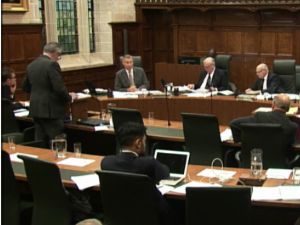UK court upholds local rape conviction
(CNS): A 42-year-old man who is serving a twelve-year term for raping his former girlfriend will remain in jail after an appeal by his lawyers to the UK’s Privy Council failed. Dwight Wright had taken his case to London after the Cayman Islands Court of Appeal rejected his claim that his conviction was unsafe because his trial judge did not warn him in open court that if he didn’t give evidence he was entitled to draw an adverse inference from his silence. The panel of UK judges found that, although the judge had not read out the warning, he had established that Wright’s lawyer had told him and he was well aware what his silence meant.
The British judges heard the case last December and delivered their judgement on 30 June, which has now been published on the court’s website:
Wright was convicted in 2012 of raping of his ex-lover after several months of stalking her. On the day of the offence he kicked down her door and forced his way into her home, where he raped and sexually assaulted her throughout the night. She reported the rape early the next morning after Wright left. Five days later he was arrested at his home, where police officers found him hiding under the bed.
Wright, however, pleaded not guilty, stating that he was invited to the woman’s home and the sexual intercourse was consensual. Although a reluctant witness, in the end the victim answered questions and refuted the suggestions that she had given consent and revealed the persistent stalking.
During the judge alone trial, the defendant did not take the witness stand. Initially, he had planned to do so but on the morning he was due to be called his attorney told Justice Alex Henderson, who presided over the case without a jury, that his client had changed his mind.
While the judge did not read out the section of the law that allows a judge to draw an adverse inference from the silence of a defendant if there is a case to answer, he made it clear he was considering that negative view of the man’s silence. Wright’s lawyer had also made it clear in court that his client was aware of the potential negative consideration and there was never any indication that it came as a surprise.
During their review of the case, the Privy Council judges upheld the conviction. Despite the omission of stating the law in open court, they found that it was clear that Wright knew very well the outcome of his decision not to give evidence.
“Whether or not to give evidence is probably the most significant decision which a defendant has to make in the course of his criminal trial. This decision will almost invariably be the subject of close consideration by him in conjunction with his advisers,” the judges said, adding it was clear he had the benefit of advice on the adverse inference issue as well as many other factors before he chose to remain silent.
Describing the omission by Henderson as “an irregularity”, the judges stated in their ruling that it was clear the advice had been given and the irregularity was immaterial to the safety of the conviction.
“It is beyond argument that the appellant knew,” the judges found. They pointed out that the judge had asked the defense attorney if Wright had been given the relevant advice before making his decision and was told he had on at least two different occasions and the judge had made it clear that he had in mind the drawing of adverse inference.
“If the truth had been that the possibility had never been considered by the appellant, nor ever addressed by counsel in any of his conferences with him, counsel simply could not have failed to realise this once this discussion with the judge was embarked upon. If that had been the true position, he could plainly have said so at once. That would have been his clear duty,” the Privy Council panel found.
“Nothing would have been easier than to tell the judge that no such inference could be drawn because it would in the circumstances be unfair to the appellant … there is no hint of any evidence, or even of assertion, by the appellant that he was under any misapprehension as to what might happen if he chose not to give evidence,” the judges concluded as they upheld the conviction.





































GREAT
Desperate attempt by a criminal to get off his crimes. There should be additions to sentences for such immoral behaviour. Were public funds wasted on this frolic?
Even when he was 11 years of age (and maybe younger but definitely at 11) he was molesting girls. But the authorities said Caymanians dont need mental help or this silly counselling thing that foreigners do so………………